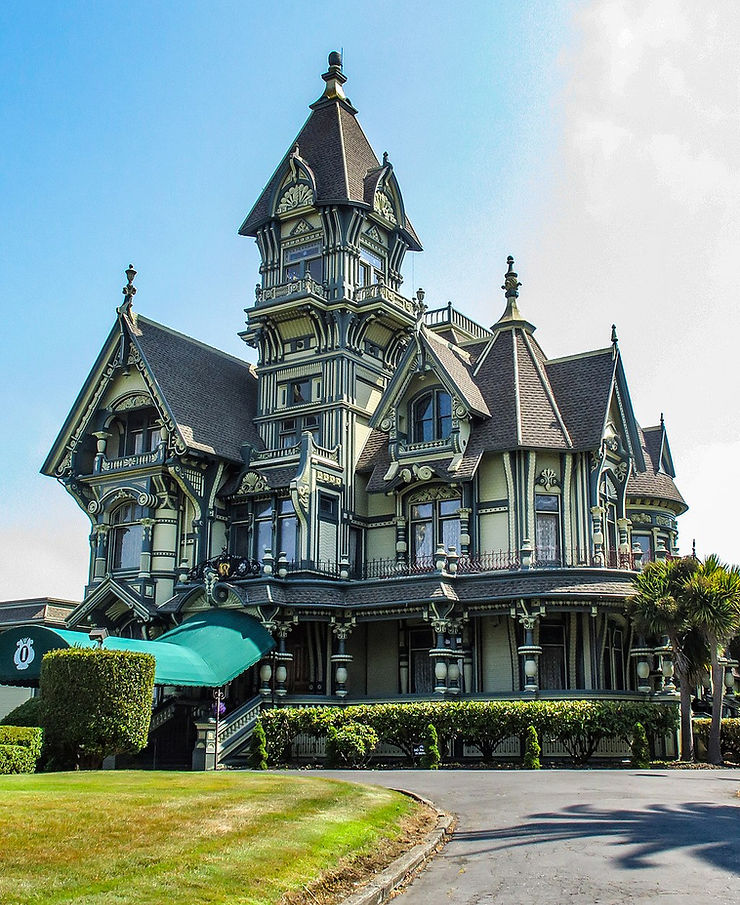"The Most Grand Victorian Home in America" The Carson Mansion - Eureka, CA, Take A Look Inside!
- Historical Homes of America

- Apr 8, 2020
- 2 min read
Updated: Sep 10, 2020

The Carson Mansion is a large Victorian house located in Old Town,Eureka,California. Regarded as one of the highest executions of American Queen Anne style architecture, the house is "considered the most grand Victorian home in America." It is one of the most written about and photographed Victorian houses in California and perhaps also in the United States. Originally the home of William Carson, one of Northern California's first major lumber barons, it has been a private club since 1950. The house and grounds are not open to the public.
See More of What Eureka Looked Like in The Past By Clicking Here: Eureka and Humboldt County (CA) (Images of America)

William Carson (July 15, 1825 New Brunswick – February 20, 1912 Eureka), for whom the house was built, arrived in San Francisco from New Brunswick,Canada, with a group of other woodsmen in 1849. After rolling out gold slugs in San Francisco, they joined in the northern gold rush, arriving in the Trinity Mountains via the Eel River and Humboldt Bay. They left the Trinity Mountains to overwinter at Humboldt Bay and contracted to provide logs for a small sawmill. In November 1850, Carson and Jerry Whitmore felled a tree, the first for commercial purposes on Humboldt Bay. All winter, Carson and his team hauled logs from the Freshwater slough to the Pioneer Mill on the shores of Humboldt Bay. In spring, the party went back to the mines where they had previously staked claim on Big Bar by the Trinity. They built a dam and continued mining until they heard that a large sawmill was being built at Humboldt Bay. They went south through the Sacramento Valley, bought oxen, and returned to Humboldt Bay by August 1852, where Carson, alone, went into the lumber business permanently. In 1854, he shipped the first loads of redwood timber to San Francisco. Previously, only fir and spruce had been logged.
The house is a mix of every major style of Victorian architecture, including but not limited to: Eastlake, Italianate, Queen Anne(primary), and Stick. One nationally known architectural historian described the house as "a baronial castle in Redwood..." and stated further that "The illusion of grandeur in the house is heightened by the play on scale, the use of fanciful detail and the handling of mass as separate volumes, topped by a lively roofscape. The style of the house has been described as "eclectic" and "peculiarly American." Unlike most other houses dating from the period, this property always has been maintained, and is in nearly the same condition as when it was built. - Wikipedia
Interior via the Ingomar Club website:


Grand Staircase



In May 1964, the house was included in the Historic American Buildings Survey (HABS) as catalog number CA-1911. This is the only official historical building listing of the house. Although the historic house does merit National Register of Historic Places status, the private club has chosen not to apply for it.
Example of fireplace (Sorry for low resolution, only resolution available)

Upstairs Bedroom

Dining Room

Images of the house are prevalent in website designs and video animations as well as on posters, paintings, and book covers. This popularity also has led to replicas being created in amusement parks, including the clock tower on the train station at Disneyland.
The Mansion in 1902
